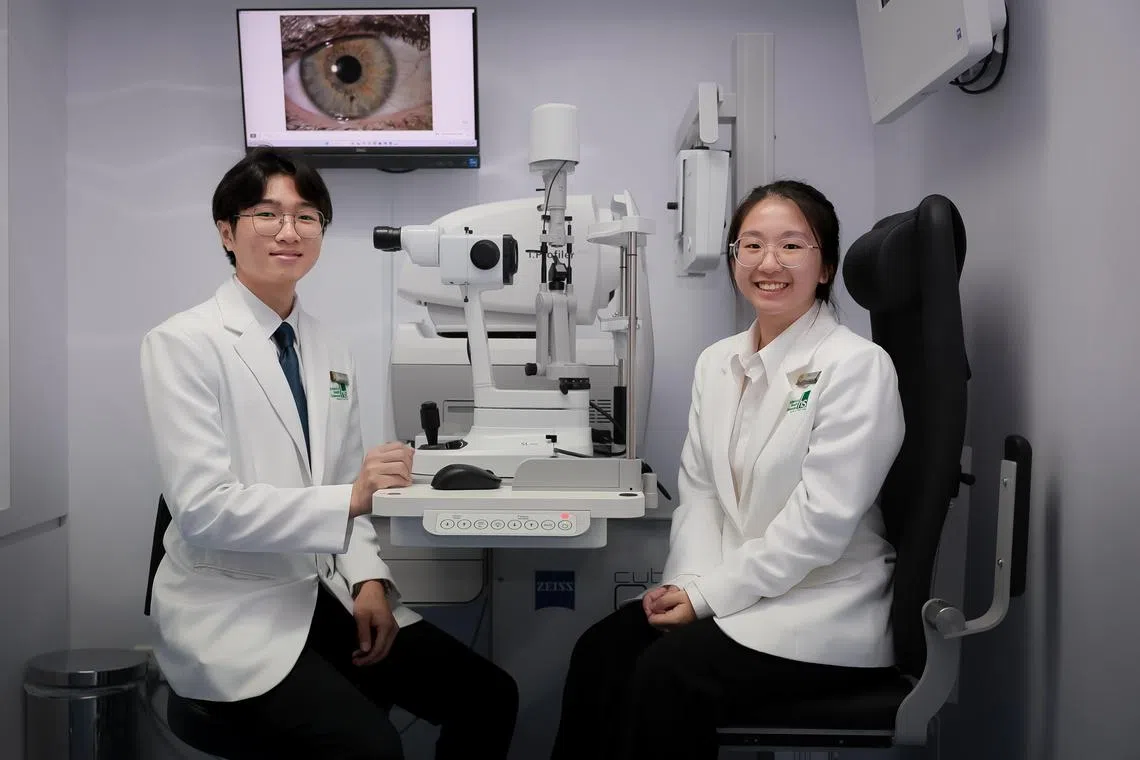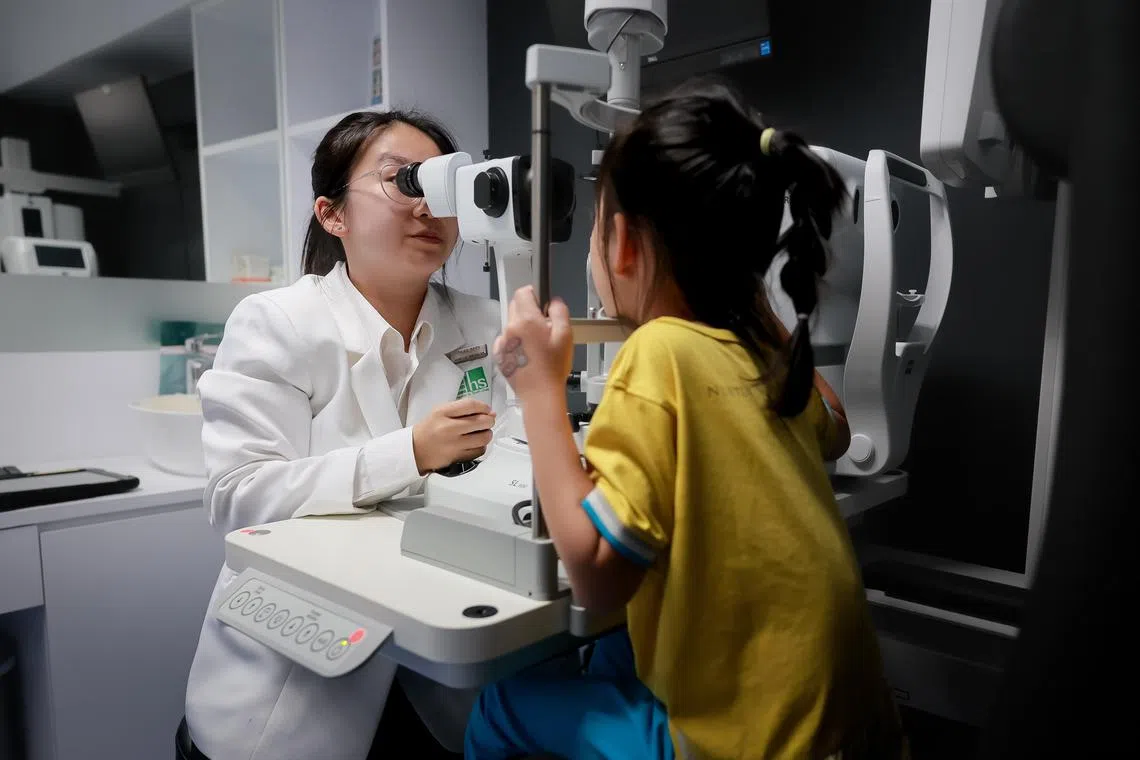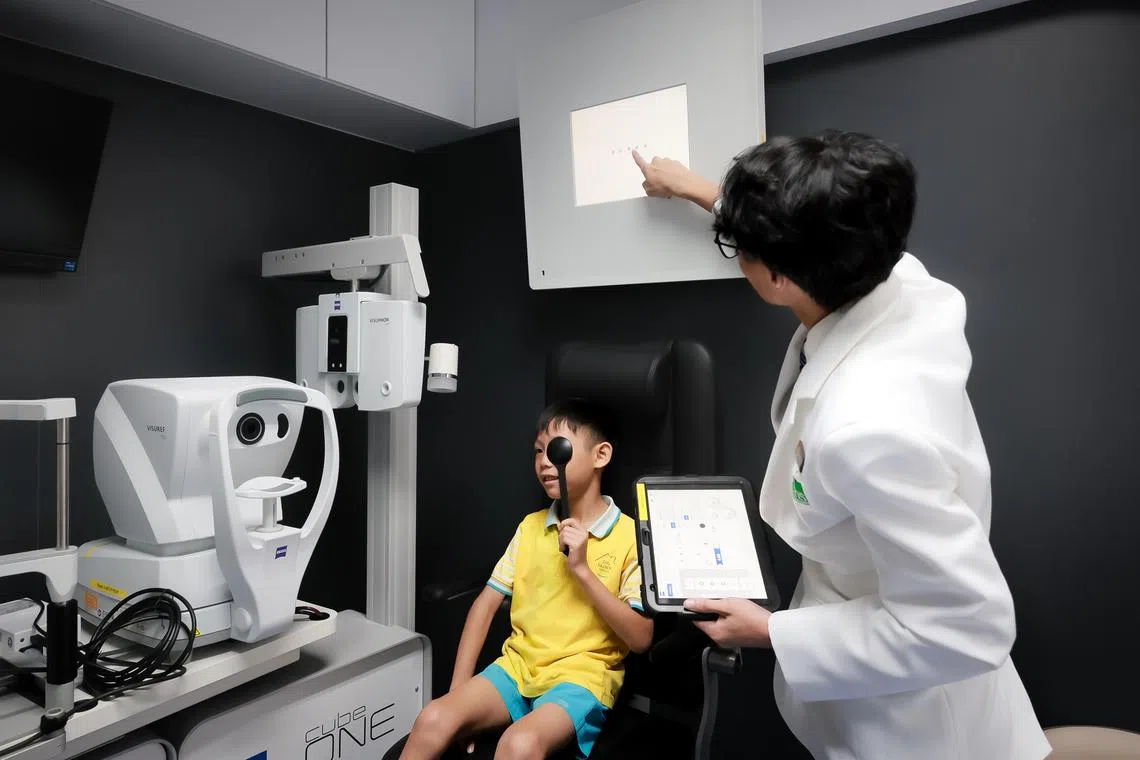5 things to know about studying optometry
The TL;DR: If you are considering studying optometry in a polytechnic, you will need not only the grades but should also be comfortable operating equipment and dealing with patients. A diploma in optometry will qualify you to practise as an optometrist in Singapore. Those who want to pursue a degree will have options to do so overseas.
Sign up now: Get ST's newsletters delivered to your inbox

Ngee Ann Polytechnic's Diploma in Optometry students Tan Kuang Hao (left) and Janelle Tan at the Ngee Ann Polytechnic Optometry Centre's NP-Zeiss Vision Management Suite on Sept 18.
ST PHOTO: GAVIN FOO
The new NP-Zeiss Management Suite, a partnership between Ngee Ann Polytechnic (NP) and optical and optoelectronic technology company, Zeiss, was launched on Sept 18, 2024.
Students get to learn from a fully digitalised system that improves the patient consultation process, screening speed and accuracy, and allows real-time data sharing. It is a key part of the enhanced curriculum co-developed by NP and Zeiss to focus on myopia management.
With the refreshed curriculum, Year 3 diploma students can also apply for a new 25-week specialised internship programme, instead of the previous 16-week attachment.
The new extended internship includes work opportunities at both Zeiss Singapore and its regional office in Manila. The internship offers a combination of hands-on clinical training and corporate exposure to students.
These changes will equip students with up-to-date skills and knowledge to prepare them for the industry, especially given Singapore’s high and increasing rates of childhood myopia, said NP.
According to the Singapore National Eye Centre, 80 per cent of young Singaporeans are myopic by the age of 18, and 20 per cent of young adults with myopia will have high myopia, putting them at greater risk of visual complications later on in life.
Besides NP, Singapore Polytechnic also offers a diploma in optometry. Diploma holders can go on to pursue related degree programmes at universities in countries such as the United Kingdom or Australia.
The Straits Times spoke to a lecturer and students to find out what it takes to study optometry and the career options it offers. If you are considering becoming an optometrist, here are the five things to know.
1. Know the difference between optometrists, opticians, and ophthalmologists
Optometrists are eye care professionals who diagnose and treat common eye diseases, injuries and vision problems.
However, they cannot perform surgical procedures for eye conditions. Surgery can only be performed by ophthalmologists, who are eye specialists with advanced medical training.
Opticians specialise in advising patients on their eyewear, by interpreting prescriptions provided by optometrists or ophthalmologists.
2. You need to meet certain requirements to enter an optometry course
The recommended aggregate for Diploma in Optometry courses for O-level graduates, following the ELR2B2-C aggregate type, is 6 to 12 for NP and 8 to 12 for Singapore Polytechnic, based on previous years’ cut-off scores. Nitec holders are required to have a minimum Grade Point Average (GPA) of 3.5.
Students are required to have taken at least one science-related subject in secondary school, but they don’t need prior expertise in vision-related science or technology.
Ms Janelle Tan, 19, a Year 3 student from NP’s Diploma in Optometry, said she’s not usually tech-savvy and did not know much about optometry before she enrolled in the course.
However, “this diploma incorporates on-the-job training, where I slowly learnt everything from day one”, she said.

Esther Chew, 6, having an eye exam by Optometry student Janelle Tan at the Ngee Ann Polytechnic Optometry Centre’s NP-Zeiss Vision Management Suite on Sept 18.
ST PHOTO: GAVIN FOO
3. You need to be comfortable operating equipment
Optometry is a mix of traditional skills and digital techniques.
As an optometry student, you will be taught how to use various eye testing equipment, using techniques like objective and subjective refraction.
Dr Martin Kwan, deputy director of School of Health Sciences and senior lecturer in NP’s Diploma in Optometry, was once a senior optometrist and clinic manager in an ophthalmology clinic. He said: “With technology always advancing, I learnt that it’s important to keep abreast of changes within the industry. This allows us to adapt to the needs of patients and clients.”
Students are taught both traditional and digital eye testing techniques so they can be versatile in handling all types of instruments in the working world, he said.
4. You need to be good with people
Optometry is not just about operating equipment to diagnose eye problems. Interacting with patients makes up the lion’s share of the work.
Mr Tan Kuang Hao, 19, another Year 3 student from NP’s Diploma in Optometry, said of patients receiving a negative diagnosis: “They tend to feel sad after hearing about their conditions, so we need to be able to reassure them.” He recalls frequently needing to put himself in patients’ shoes when explaining their eye conditions to them.
Having impact on the lives of others by treating their eye problems or correcting their vision is what makes the job rewarding, he said.

Lukas Lim, 6, having an eye exam at the Ngee Ann Polytechnic Optometry Centre’s NP-Zeiss Vision Management Suite on Sept 18.
ST PHOTO: GAVIN FOO
5. You can have different career paths
Although optometry is a niche profession, there are different types of specialties – retail, clinical, and research.
Retail optometrists run tests to prescribe eyewear in stores, while clinical optometrists perform eye examinations to diagnose issues in clinics or eye centres.
Mr Tan said: “I feel more confident working in a clinic setting as compared to a retail setting, since I find myself doing better at handling equipment than frames and lenses.”
If you prefer less front-facing jobs, corporate and research optometry is another career path you may consider. Some job responsibilities include clinical research on eye care treatments and devices, or educating other healthcare professionals on products.


